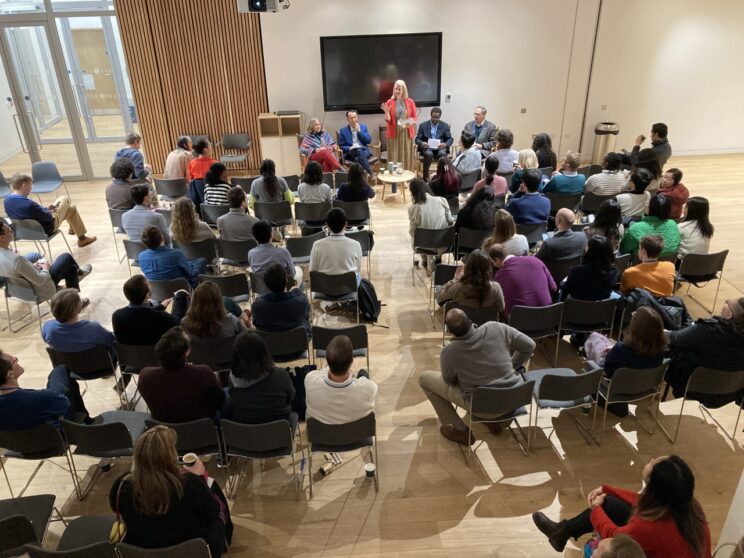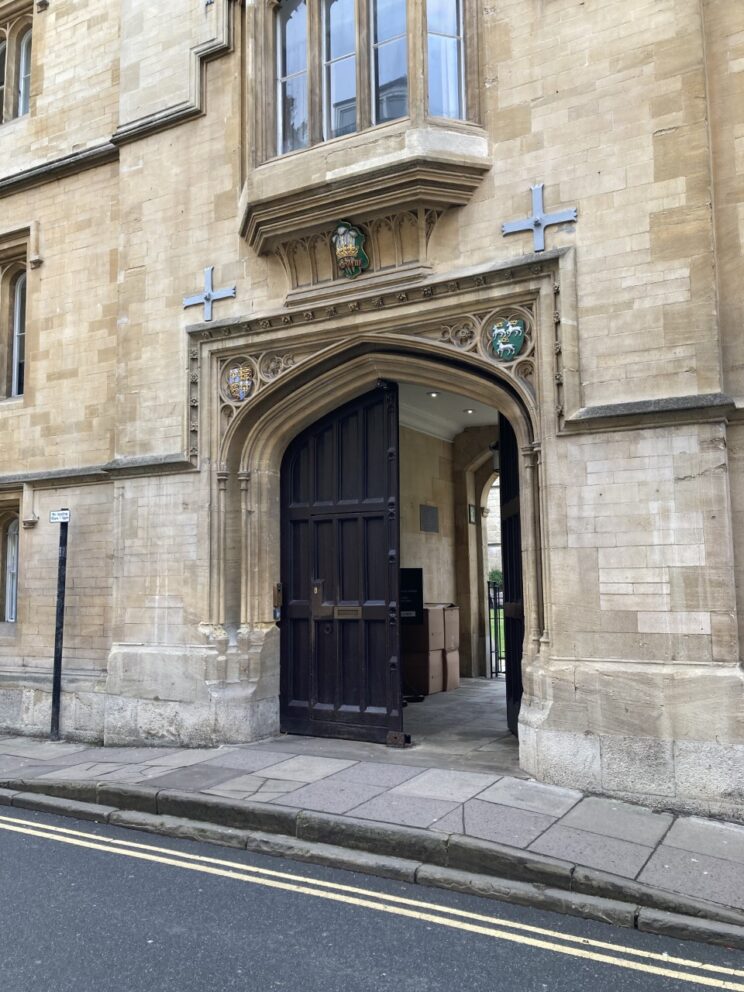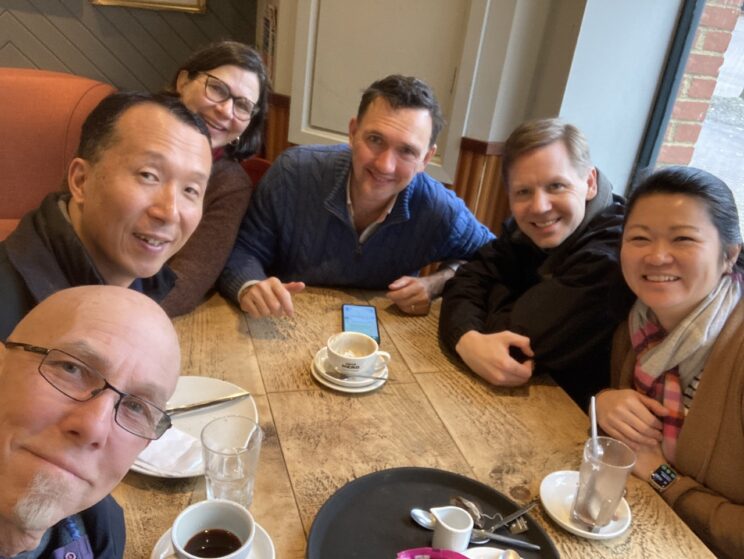
Jeff Barneson was part of a team of InterVarsity staff and faculty from Boston and North Carolina attending the Developing a Christian Mind Conference at Oxford, January 28-30, 2023. We appreciate this great report from this team who hopes to pilot similar projects at their campuses in the U.S.
Don’t let the world around you squeeze you into its own mould, but let God re-mould your minds from within.
J.B. Phillips’ rendering of the Apostle Paul’s words of Romans 12 contains a warning and an invitation. The warning is easy to understand. The academy seeks to mold graduate students and professors who worship the same idols it worships: power, prestige, and a pursuit of knowledge separate from the wisdom of God.
The invitation in Paul’s text is somewhat less clear. What might it mean to let God remold your mind from within? Are there concrete practices that are useful in the process of yielding one’s mind to the work of the Spirit? These are the questions that Developing a Christian Mind (DCM) at Oxford has been exploring and engaging for 15 years.
Each year DCM offers new graduate students and professors an opportunity to engage with these questions in community through the lens of the Christian Story. This is done in two parts:
- Christianity and the Life of the Mind. This introductory conference happens in January and invites students and faculty from across the colleges to explore generally what their calling to be disciples of Christ means for their academic life.
- Developing a Christian Mind: Seeking Wisdom. This collection of parallel conferences happens in March, when graduate students divide into their various academic fields to work with faculty on applying the broad themes discussed in January.
Along with a small group of professors and IV staff, I attended the most recent DCM. (Check out David Williams’ ESN article from 1/14/22 for an overview of the program.) Our cohort participated in the lectures, small group discussions, coffee breaks, and dinners. We were there to consider how the DCM model might help us think about better supporting graduate students and professors.
DCM has important values and design elements – honed over the years – that set it apart and make it especially useful. Here are some of those we found most compelling:
IN THE COLLEGE FOR THE COLLEGE
DCM was a project initiated by Professor Donald Hay as a means of mentoring graduate students. And from the beginning, he has been deeply committed to locating DCM in the academy – physically! Our meetings took place on campus. By gathering at the heart of the University, rather than off campus in a church meeting hall, DCM shows that the place where students spend most of their time and energy matters. It shows that doing scholarship in community with other Christians is an activity worthy of prayer, study and reflection.

DESIGNED AND LED BY MEMBERS OF THE FACULTY
A significant feature of DCM is the strong role faculty play. This also contributes significantly to the credibility of the conference in the University and among the students.
Oxford professors are invited to give lectures, during which they connect their academic work to major theological themes – Creation, Sin, Redemption, Life in the Community of Jesus, the New Creation, etc. In effect, they do a bit of their work in real time in front of an engaged crowd. During their lectures, the professors used the language and tools of their discipline to foster a dialogue between Scripture and their academic project. Both were taken seriously and treated with integrity.
ACADEMIC AND SPIRITUAL FORMATION WITHIN THE NARRATIVE OF SCRIPTURE
The Bible is essential to the shape of DCM, and graduate students are invited to consider Scripture and their academic work together. It reminds me of the founding language of Harvard, where I work with InterVarsity:
Let every student be plainly instructed, and earnestly pressed to consider well, the maine end of his life and studies is, to know God and Jesus Christ which is eternal life (John 17:3) and therefore to lay Christ in the bottome, as the only foundation of all sound knowledge and Learning.[1]
It isn’t obvious how this ought to be done. But DCM’s approach – giving professors and graduate students an opportunity to work in community on both academic and spiritual formation – is a great start.
PARTNERSHIP WITH THE CHURCH
Local congregations – especially those within the Oxford Pastorate – are overwhelmingly supportive of DCM. They welcome, pray for, and support graduate students – offering community and personal encouragement as they carry out their various ministries. But, in keeping with the principle of centering this work on campus, churches stay in their lane and let the professors take the lead.
This was true of various campus ministries as well. On a couple occasions, parachurch campus ministries made announcements about supportive activities they were offering, but they were not leading the conference.
DCM IS GOOD FOR GRADUATE STUDENTS
The opportunity for early-term graduate students to reflect theologically about their academic work near the start of their programs can’t be over-emphasized. Being squeezed into a mold is part of what students have signed up for. But having the grid of God’s Big Story as a narrative framework through which to view their academic project is a counterpoint to business as usual. And for those who may be attending DCM as curious seekers or even skeptics, it provides a thoughtful witness in an academic context.
DCM IS GOOD FOR PROFESSORS
While graduate students are the recipients of the faculty talks and mentoring during DCM, the project conveys significant benefits to the professors as well. For one thing, it gives professors a significant role in designing and implementing a very cool ministry. And they get to do it TOGETHER!
And the invitation to give a lecture that calls for Scriptural reflection and thoughtful interaction with their own field of study provides a nudge for them to spend time in prayer, reflection, and application – a project that they may not have engaged previously. In this way, DCM becomes a means of spiritual formation for the professors who participate.
GOING FORWARD’
DCM takes Paul’s invitation – “let God re-mould your minds from within” – seriously. The particular way they go about it has distinctive features that contribute significantly to its success. As ministries in other contexts consider whether DCM models something that would serve professors and graduate students in their communities, they would be well served to preserve some of those distinctives.
That is our hope for Boston. As we think about how to pilot DCM here, we want to make sure it is designed and led by professors, takes place in the heart of campuses, and will take Scripture and academic disciplines seriously in an attempt to foster both academic and spiritual formation.

Note: I’m especially grateful to the DCM team, including Donald Hay, Ard & Mary Louis, my IV staff colleagues, Alissa and David Williams, Jessica Cheng, Marcia Wang and my traveling companions Jimmy Kim, Troy Van Voorhis, Catherine Crouch and Susan Park. Also, Hank Tarlton and Jeremy Purvis, from the University of North Carolina at Chapel Hill.
[1] Harvard’s “Rules and Precepts,” adopted in 1646
Jeff Barneson is a senior campus staff minister with InterVarsity’s Graduate and Faculty Ministries and Associate Director on the national Faculty Ministry Leadership Team. He has spent nearly 40 years reading the Bible, drinking coffee and hanging out with professors and graduate students at Harvard. Jeff is married to Tara Edelschick, who has her own remarkable story of following Jesus. Currently she serves as a professor for incarcerated men through the Emerson College Prison Initiative. They have two boys in college and a girl who is a preschool teacher in Cambridge. Jeff has degrees in Engineering, Theology and Public Administration. He loves bicycle racing, bee keeping and roasting coffee.

Leave a Reply